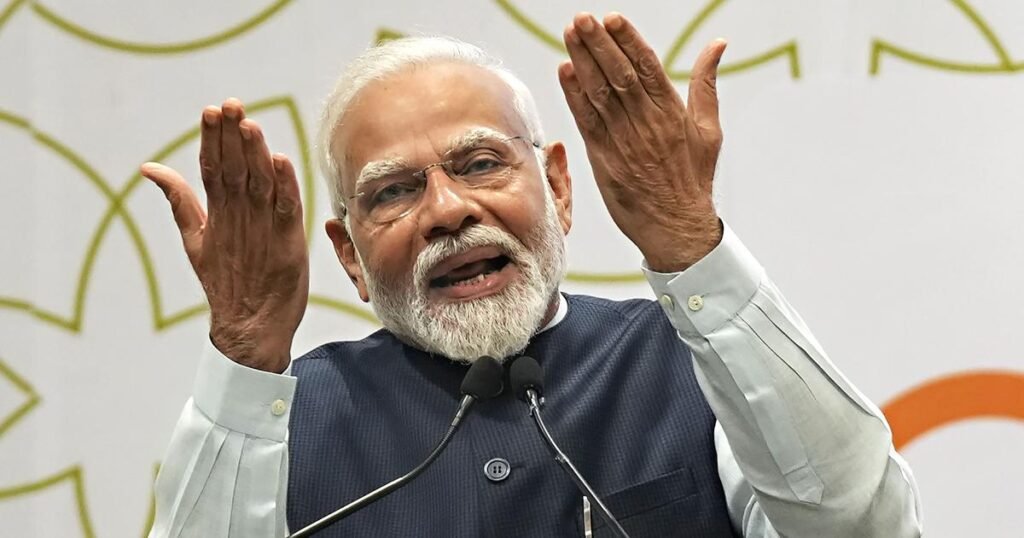Prime Minister Narendra Modi

(Photo Credit: Hindustan Times)
Prime Minister Narendra Modi’s visit to Russia on July 8–9 for a bilateral summit with President Vladimir Putin is crucial to India’s strategic planning. The Ukraine conflict is poised to intensify, and the ongoing Israeli war against Hamas in Gaza shows no signs of abating. This visit underscores India’s need to navigate the shifting geopolitical landscape effectively.
Strengthening ties with Russia is part of a broader strategy to ensure India’s interests are safeguarded amid escalating global tensions. Modi’s discussions with Putin will likely focus on enhancing cooperation in various sectors, reinforcing bilateral relations, and addressing the challenges posed by these persistent conflicts. This summit is a pivotal moment for India as it seeks to bolster its position and prepare for the uncertainties that lie ahead on the international stage.
Adding to this, Pakistan, under the leadership of Munir Akram, known for his anti-India sentiments, is set to join the UN Security Council as a non-permanent member for a two-year term starting in January 2025, supported by its close ally China. This development raises concerns about potential efforts to target Indian nationals with unfounded terrorism charges, as seen previously, or to push resolutions regarding Jammu and Kashmir. Additionally, India’s absence from the International Human Rights Council in Geneva next year is noteworthy.
Last experienced in 2018, this absence coincided with the Council’s issuance of a report alleging human rights violations in Jammu and Kashmir. These geopolitical dynamics underscore the importance of India’s diplomatic engagements and strategic initiatives to safeguard its interests on the global stage.
India faces a pressing need to adopt a proactive stance in multilateral forums, given Pakistan’s Munir Akram’s impending role alongside China in potentially isolating India at the UN. In response to these diplomatic challenges, Prime Minister Narendra Modi has chosen to visit Russia, marking his first bilateral summit with President Vladimir Putin since 2019. This decision underscores India’s strategic imperative to strengthen relations with Moscow amidst evolving global dynamics.
The backdrop to Modi’s visit includes heightened tensions witnessed at the G-7 summit in Italy, where indications pointed towards Western nations escalating involvement in Ukraine, potentially including military deployments. President Putin, in response, has issued warnings of arming adversaries of Western interests in the event of further escalations in Crimea or within Russia itself. Notably, he has not ruled out the deployment of tactical nuclear capabilities.
This strategic maneuvering by India and Russia reflects their shared interests in maintaining regional stability and countering external pressures. For India, it becomes crucial to leverage its diplomatic engagements to safeguard its national interests, particularly amidst contentious issues like Kashmir and potential UN resolutions. Modi’s discussions with Putin are expected to focus on enhancing defense cooperation, economic ties, and strategic partnerships, aiming to fortify India’s position in the face of evolving global power dynamics.

The upcoming July summit between PM Modi and President Putin is increasingly seen as a platform for aligning worldviews rather than focusing solely on bilateral outcomes. Against a backdrop of shifting global dynamics, India faces a necessity for nimble international diplomacy. Potential shifts in leadership, such as a possible Labour Party victory in the UK and challenges to President Macron’s authority in France, along with upcoming US presidential elections featuring Joe Biden and Donald Trump, add layers of complexity.
The situation is further complicated by Western pressures on Russia over Ukraine, prompting Putin to navigate a delicate balance with Chinese President Xi Jinping, despite Beijing’s encroachment in Russia’s eastern periphery. India finds itself in a nuanced position, criticized by the West for maintaining open channels with Russia, crucial for its significant military supplies. Meanwhile, China is expanding its naval presence in the Indian Ocean Region through initiatives like the Belt and Road Initiative (BRI), engaging countries like Bangladesh, Maldives, Sri Lanka, and Pakistan.
In response, Indian diplomacy must be agile and proactive, abandoning passive stances. Maintaining strategic independence while managing relationships with both Russia and China becomes imperative. India’s diplomatic strategy needs to navigate these complexities to safeguard national interests, particularly amidst regional power dynamics and military strategic imperatives in the Indo-Pacific.
Disclaimer:
The information provided is based on current geopolitical analyses and speculative scenarios. Actual political developments and outcomes may vary. It is important to consult official sources and expert analyses for accurate and up-to-date information on international relations and diplomatic activities.
Stay tuned to Club4Celebs for more updates


